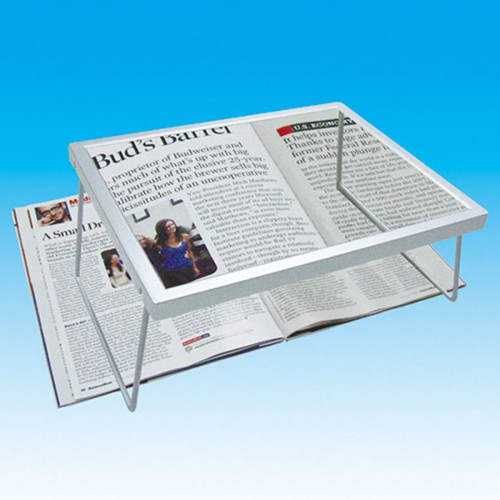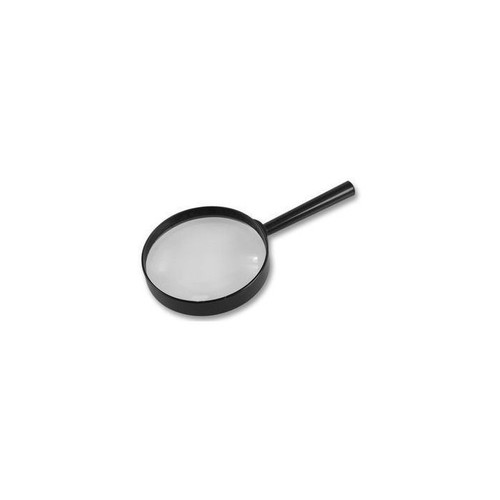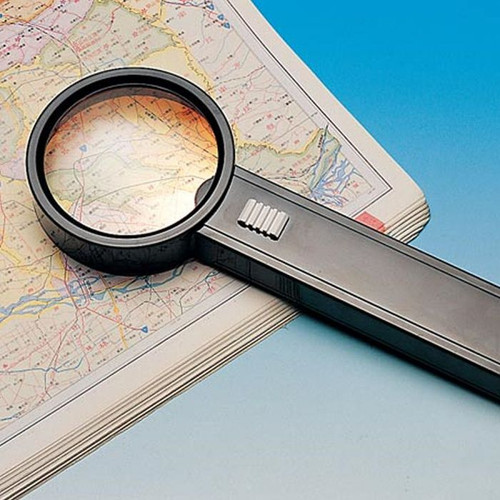Perfect for those with limited vision, this Folding A4 Magnifier and Stand provides an easy and convenient way to read large areas of print. Robust and durable, it is suitable for a variety of different tasks such as crafts, coin collecting, crosswords and sewing. It can be used hands-free and folds down to a compact size for easy storage.
Magnifier and Stand Information:
- Hardwearing and robust
- Perfect for reading fine detailed print
- Can be used hands-free
- Folds down to a compact size
- Suitable for individuals with limited vision
- Versatile and useful household aid
- Magnification: x2
- Magnifier length: 279mm (11")
- Magnifier height: 210mm (8.5")
- Magnifier weight: 280 gms
Is there any difference between a stand and a hand magnifier?
Yes, there can be differences between a stand magnifier and a hand magnifier, primarily in terms of their design and functionality:
Design:
- Stand Magnifier: As the name suggests, a stand magnifier typically comes with a built-in stand or base, allowing it to be placed on a surface for hands-free use. This design is convenient for tasks where you need both hands to manipulate objects while viewing them magnified.
- Hand Magnifier: Hand magnifiers are designed to be held in the hand during use. They often have a handle or grip for easy manipulation. This design is useful for tasks where you need to move the magnifier around or examine objects from different angles.
Magnification Power:
Both types of magnifiers can come in various magnification powers, but some stand magnifiers might have higher magnification capabilities since they are designed for more stationary use and may have larger lenses.
Application:
Stand magnifiers are often used for tasks such as reading, crafting, or examining small objects where hands-free operation is beneficial.
Usage Comfort:
- Stand magnifiers can offer more prolonged comfort during extended use since they don't require you to hold them up.
- Hand magnifiers offer flexibility but may cause fatigue during extended use if they are not ergonomically designed.
In summary, while both stand and hand magnifiers serve the purpose of magnifying objects, their design, functionality, and ideal usage scenarios can differ. The choice between the two depends on the specific needs and preferences of the user and the tasks they intend to perform.
What are the disadvantages of hand held magnifier?
Hand-held magnifiers offer convenience and portability, but they also come with some disadvantages:
- Limited Field of View: Hand-held magnifiers typically have a smaller lens size compared to stand magnifiers or other magnification devices. This limited lens size can restrict the field of view, making it challenging to view larger objects or read multiple lines of text at once.
- Hand Fatigue: Holding a magnifier for extended periods can lead to hand fatigue, especially if the magnifier is heavy or if the user has to hold it at a certain angle for an extended period to achieve optimal magnification.
- Shakiness: Hand-held magnifiers can amplify hand tremors or movements, resulting in shaky images or difficulty maintaining focus, especially at higher magnification levels.
- Inconvenience for Some Tasks: While hand-held magnifiers offer portability, they may not be suitable for tasks that require hands-free operation or stability, such as detailed crafting or intricate repair work.
- Distance Limitation: Hand-held magnifiers often require the user to hold them at a specific distance from the object to achieve optimal focus and magnification. This distance limitation can be inconvenient for tasks that require variable distances or where the user needs to maintain a comfortable posture.
- Lighting Dependency: Hand-held magnifiers rely on ambient or external lighting to illuminate the object being magnified. Inadequate lighting conditions can affect the clarity and effectiveness of the magnification, leading to eyestrain or difficulty in discerning details.
- Storage and Handling: Hand-held magnifiers require proper storage to prevent damage to the lens or handle. Additionally, handling them without care can lead to scratches or smudges on the lens, which can impair visibility.
Does a bigger magnifying glass make a difference?
Yes, the size of a magnifying glass can make a difference in several ways:
- Magnification Power: Generally, larger magnifying glasses have larger lenses, which can provide higher magnification power. This means that they can enlarge objects more, making it easier to see fine details or small text.
- Field of View: A larger magnifying glass typically offers a wider field of view compared to a smaller one. This allows you to see more of the object you are magnifying at once, which can be advantageous for tasks such as reading or examining larger objects.
- Comfort: Holding a larger magnifying glass may be more comfortable, especially during prolonged use, as it distributes the weight more evenly across your hand. Additionally, larger magnifiers often have larger handles or grips, providing better ergonomics and reducing hand fatigue.
- Ease of Use: Larger magnifying glasses can be easier to position over the object you want to magnify, especially if you need to maintain a certain distance or angle for optimal magnification. This can be particularly beneficial for individuals with dexterity issues or shaky hands.
- Light Gathering: Larger lenses can gather more light, which can enhance visibility, especially in low-light conditions. This can be helpful when examining objects with fine details or when working in dimly lit environments.







